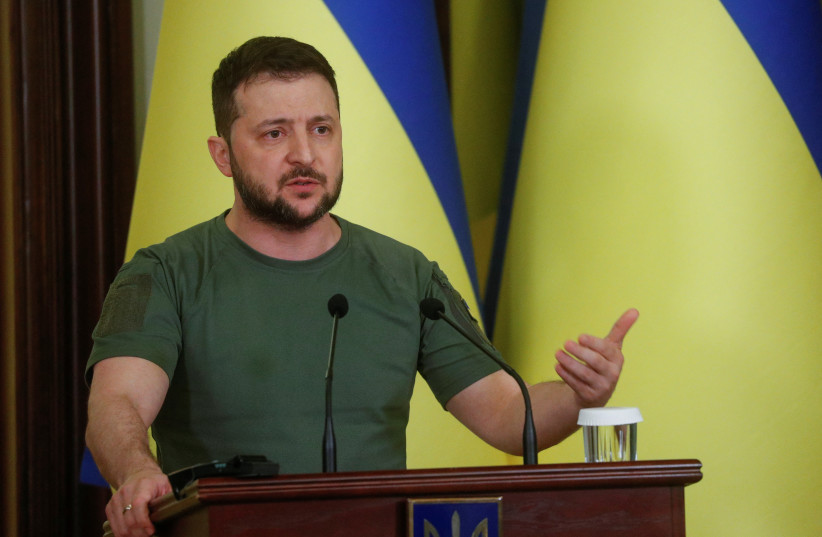Leonid Kravchuk, a former communist who helped sign the Soviet Union's death warrant and then served as the first president of independent Ukraine – and who was the first Ukrainian leader to publicly condemn his country's involvement in antisemitism during World War II – died on Tuesday at the age of 88.
President Volodymyr Zelensky, now leading Ukraine as it confronts invading Russian forces, described Kravchuk as a wise leader who guided the country in the chaotic first years of independence from Soviet rule.
"He was a person always able to find wise words and express them in such a way that they were heard by all Ukrainians," Zelensky said in his nightly video address.

"Particularly in times of crisis. When the future of an entire country can depend on the wisdom of one person."
Ukraine's sixth and current president said that Kravchuk displayed such wisdom as Ukraine's national movement gained strength in the late 1980s, culminating in a December 1991 referendum in which more than 90% of voters chose independence.
Kravchuk was elected president the same day.
"He acted brilliantly in 1991 and it is only now that it appears that things were easy for him," Zelensky said.
Also in 1991, Kravchuk stood at Babi Yar in Kyiv, the site of the largest massacre carried out by the Nazis, killing some 33,000 Jews, and vowed that such a monstrosity should never occur again. His words, spoken on the 50th anniversary of the massacre, marked the first time that the Ukrainian government publicly acknowledged, and even apologized for, the antisemitism behind the decision of some Ukrainians to work with Nazis during World War II.
“Antisemitism still finds in some places its speakers, but they will have to know they will get no support on Ukrainian lands,” US media reported that Kravchuk told a crowd of about 10,000, including some survivors of Babi Yar, who gathered to honor those murdered.
“The history of the relations between the Ukrainian and Jewish peoples . . . has both brilliant and black pages,” Kravchuk continued. “But let us remember not just to preserve old wounds but to ensure this does not happen in the future.”
At the turn of the century, there were three million Jews in Ukraine. More than a million left after a string of pogroms. During World War II, several hundred thousand Jews fled to Russia. It is reported that 200,000 fought at the front against Germany; 500,000 died in Nazi camps.
Although the Soviet government put up monuments to Babi Yar in 1966, it was not until this year that it acknowledged that the majority of those killed were Jews.
Under Kravchuk's leadership, the historical record was corrected in Ukraine. Schoolbooks were re-written to teach children factual history. The grand boulevards of Kiyv were hung with banners to commemorate the 1941 tragedy of Babi Yar.
Kravchuk became known as the "wily fox" as he rose through the ranks of Ukraine's Communist Party, taking over as head of the parliament in what was then a Soviet republic in 1990.
But he quit the party soon after a failed coup against Soviet leader Mikhail Gorbachev in August 1991. Ukraine's parliament adopted a declaration of independence the same month.
AGREEMENT THAT BROUGHT DOWN THE SOVIET UNION
In December 1991, he signed the Belovezha accords with Russian President Boris Yeltsin and Belarusian leader Stanislav Shushkevich, which effectively triggered the Soviet Union's collapse.
"I understood Ukraine could never be really independent if the USSR still existed," Kravchuk said. "I came there knowing Ukrainians' aspirations to be independent. I was fulfilling their will."
Yeltsin died in 2007; Shushkevich died last week.
Ukrainian Defence Minister Oleksiy Reznikov said Kravchuk's role in placing Ukraine on the path to independence was especially important in view of the country's current struggle.
"With his signature, the evil empire disintegrated," Reznikov tweeted. "Thank you for the peaceful renewal of our independence. We’re defending it now with weapons in our hands."
In 1994, with Ukraine mired in economic crisis and corruption and Kravchuk facing accusations of "plundering" the country, he was defeated at the polls by former missile factory boss Leonid Kuchma. He remained in parliament until 2006.
In 2020, by then a white-haired elder statesman, Kravchuk was appointed to represent Ukraine in efforts to end the conflict that broke out in 2014 between Russian-backed separatists and pro-government forces in eastern Ukraine.
Taking a tough stance against Moscow, he said it was not worth expecting anything from Russia because its objective was "to destroy Ukraine."
In January 1994, he signed an agreement with Yeltsin and US President Bill Clinton, securing $1 billion in compensation in exchange for Ukraine giving up its post-Soviet nuclear arsenal — the world's third-largest.
As president, he also signed a cooperation accord with the European Union.
Kravchuk was born near Rivne in western Ukraine on January 10, 1934.
